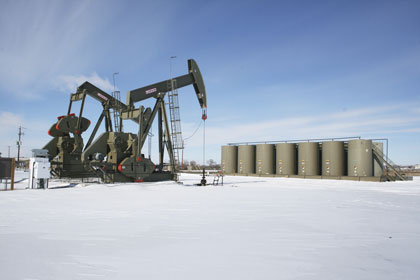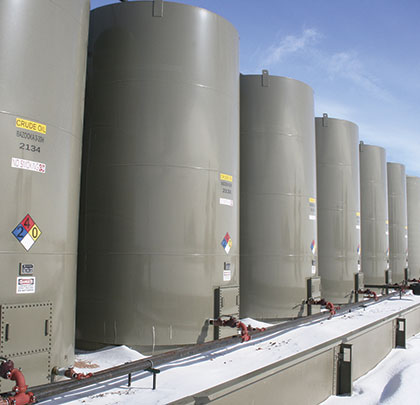In late 2014, the United States became the world’s leading producer of natural gas. In other news, up is down, dogs can talk and the sun now rises in the west. Okay, maybe the ongoing boom in domestic oil and natural gas production—which is being driven largely by historic recovery rates in the nation’s shale plays, particularly the Bakken in North Dakota—isn’t as dramatic as those last three examples, but it has forced a change in the way the industry is being perceived.
PERCEPTION EQUALS REALITY
This change in perception not only concerns the noteworthy amounts of oil and natural gas that are being produced, but how and where they are being recovered, along with the makeup of the commodities and how that affects their handling, transport, storage and refining.
“It’s a left-brain, right-brain type of situation,” says Tom Roberts, field supervisor for Pelican Gathering Systems, LLC, New Town, North Dakota. Pelican is a subsidiary of Slawson Exploration Company, Inc., Wichita, Kansas. “What they’re doing up there in the Bakken in North Dakota is on a bigger scale than what I’ve seen before because what they do is have six to eight well bores on one site with huge tank batteries. One site might pump 2,000 to 2,500 barrels off-site because of so many well bores. It’s an entirely different way of doing things.”
Roberts knows of which he speaks. For the fifteen years prior to his joining Pelican, he worked on a 500-mile, 16-inch pipeline system that bisected New Mexico from northwest to southeast and into Texas. In that case, the commodity being transported was traditional West Texas Intermediate crude oil. Since moving north, he has discovered that Bakken crude is an entirely different animal. Specifically, it can be defined as a “three-phase” liquid in that it is of a light viscosity with a high concentration of entrained natural gas and other components that affect its specific gravity from day to day.

Featured Image: The rare characteristics of Bakken-produced crude oil creates the need to identify pumping technologies that can work in unison with its various properties, including high levels of entrained gases and low viscosity.
Above: Since initiating its Bakken operations in late 2012, New Town, North Dakota-based Pelican Gathering Systems, a subsidiary of Slawson Exploration Company, Inc., has produced more than ten million barrels of crude oil. Critical to the effective operation of the company’s transport, delivery, transfer and storage system is the pumping equipment, and the pump of choice for Pelican Gathering Systems is Blackmer® X Series Sliding Vane Pumps.
BANKING ON THE BAKKEN
Slawson Exploration is a privately held oil-and-gas exploration company that was founded in 1957 by Donald C. Slawson. Since its inception it has drilled more than 3,500 wells in ten states. Its current exploration and production operations in the Bakken are centered near the New Town, North Dakota, area, which is located near Lake Sakakawea, 70 miles east of Williston and 140 miles northwest of Bismarck.
Once Slawson’s Bakken oil and natural gas are produced, they are transferred from the wellhead into a Pelican pipeline system, which moves the commodities to one of four delivery points: a pair of rail terminals near New Town or two connection points with other pipeline companies.
Since initiating its Bakken operations in late 2012, Slawson has produced more than ten million barrels of Bakken crude oil, with 930,000 barrels alone recovered in January 2015.
To transport the produced products, Pelican uses polyethylene pipeline that has a maximum working pressure of 125 pounds per square inch (psi). Once the commodities reach the pump stations, however, steel pipe with a rating of 600 psi is used to move them into storage tanks, with 6,400 to 12,800 barrels of storage space located on-site. From the storage tanks they are eventually transferred to railcars that take them to the next link in the supply chain.
FACING DOWN TRANSPORT TROUBLES
Critical to the effective operation of this transport, delivery, transfer, and storage system are the pumps that are used to introduce the oil and natural gas into the pipeline at the wellhead, transfer it through a series of switching stations located along the pipeline and then deliver it to the storage tanks.
“The pipeline itself has a 125-pound working limit and some of the pipe runs are quite long with many laterals so pressure consistency is very important to keep well production at its optimum,” says Mark Williams, corporate account manager for Farmington, New Mexico -based Horizon Power Systems, a designer, fabricator and servicer of oilfield production equipment and systems. “The inlet pressure to the pipes can vary a lot according to the tank-battery level and how much gas is entrained in the oil. This can result in vapor-lock conditions if the pump is not able to work through upset conditions.”
Slawson was using a brand of gear pumps in these critical applications, but Roberts had begun to notice that their operation would begin to be compromised when the vapor pressures varied too much, which hampered the overall efficiency of the pipeline operation.
“The thing about the gear pumps is they are more particular when talking about vapor pressure; they need the right head pressure to keep a constant flow,” he says. “I had a lot of calls from the field where my guys were saying that the pump’s vapor-locked and there are still five feet of product in the tank.”
A LOOK AHEAD
In the search for a solution, Roberts reached out to Williams and Horizon Power Systems. Specifically, we’ll see how the X Series Sliding Vane Pumps from Blackmer® provided a workable solution that met the needs of the application and proved itself an affordable option.
For More Information
Doug Cumpston is director, sales and business development North America energy PSG®. He can be reached at 303.766.2755 or doug.cumpston@psgdover.com. Blackmer® is a leading brand of rotary vane and centrifugal pump and reciprocating compressor technologies from PSG®, a Dover company. Headquartered in Oakbrook Terrace, IL, USA, PSG is comprised of several leading brands, including Abaque®, Almatec®, Blackmer®, Ebsray®, EnviroGear®, Griswold™, Mouvex®, Neptune™, Quattroflow™, RedScrew™ and Wilden®. For more information, visit www.blackmer.com or www.psgdover.com.
____________________________________________
MODERN PUMPING TODAY, November 2016
Did you enjoy this article?
Subscribe to the FREE Digital Edition of Modern Pumping Today Magazine!



